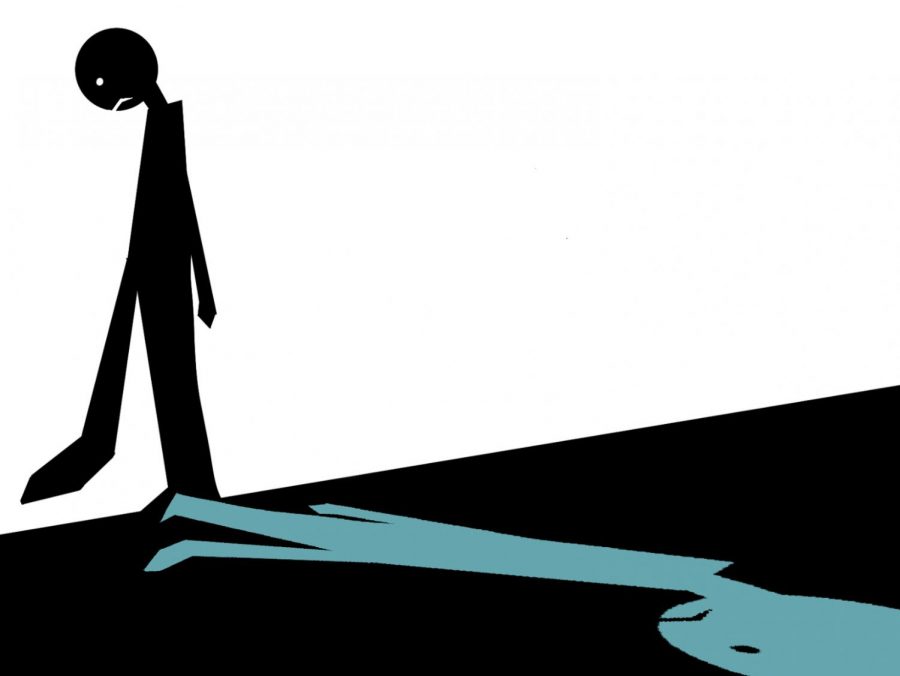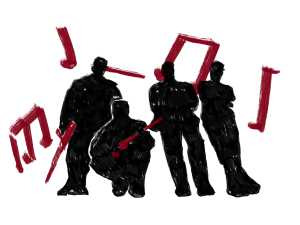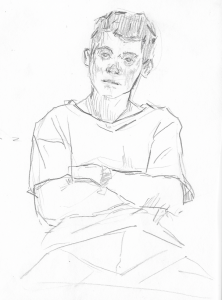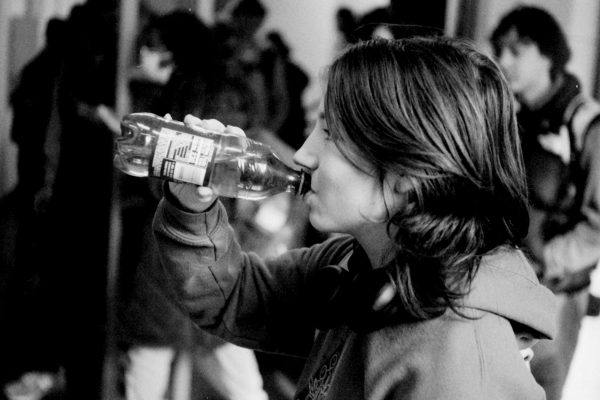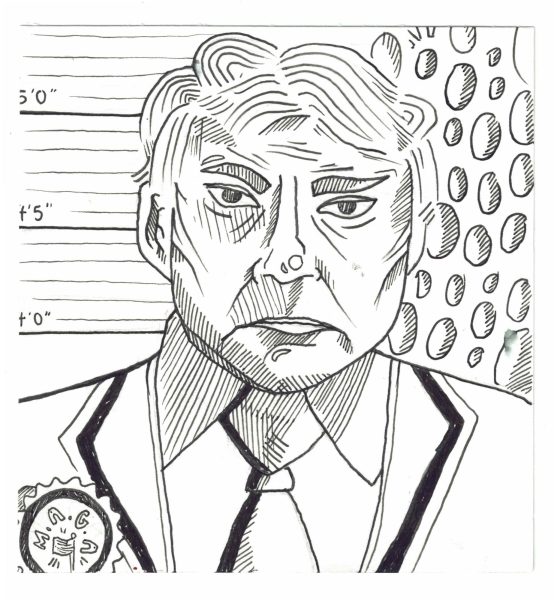CRLS Students Frustrated at Administration’s Negligible Response to Misogyny
April 29, 2021
On March 14th, misogynistic photos and screenshots posted by members of the CRLS football team circulated on social media, causing backlash and outcry from other students. One of the posts asked why women did not like being referred to as “females,” and ironically questioned if they would rather be called “b*tches” instead. Another post was a screenshot of a Snapchat conversation in which an unnamed student expressed desire to go back to a time when women “shut up and sucked d*ck like they used to.” Many students took to their own social media accounts to criticize the posts and call out others who did not speak up as well.
Later that night, Kamaal Waterman ’21, a linebacker on the football team, started a livestream on Instagram to, in his words, “let people voice their opinions and turn it into a[n] educational thing” and acknowledge that the posts were “degrading and disrespectful.” Waterman himself did not post misogynistic language, but he told the Register Forum that he “thought the situation was funny and didn’t think it was going to grow into something this big,” also stating that “the [football players] apologized to … all the people [on the livestream] and it should’ve been done at that.” The livestream went on for hours, at one point surpassing over 300 viewers, as Waterman invited other students on the livestream to discuss various topics spanning from “rape culture” at CRLS to colorism. Despite Waterman’s intentions, some students believed the livestream was ineffective. Ella Simons ’21, who spoke on the livestream, expressed to the Register Forum that the livestream “felt somewhat productive, minus the times that the girls who were sharing their thoughts were repeatedly talked over.”
The livestream went on for hours, at one point surpassing over 300 viewers, as Waterman invited other students on the livestream to discuss various topics spanning from ‘rape culture’ at CRLS to colorism.
As for the consequences the football team faced, Isaac Darien ’21, a wide receiver, stated that “several players were suspended [from] the game that week, and the team had to run extra laps as well during practice.” Some players also “had to stay after practice to meet with the coaches and discuss what could be done going forward.” Many students felt this consequence was minimal, pointing out that running extra laps is an adequate punishment for tardiness to practice, not promoting misogyny. “Doing laps [and] being suspended from games isn’t going to teach people how to respect one another,” Simons stated. After being disappointed by the consequences from the coaching staff, students eagerly turned to the administration in hopes of a more effective response.
Tom Arria, Director of CRLS Athletics, told the Register Forum that “the Athletic Department has put together a workshop program for some current student athletes and coaches.” He identified two educational programs—“Coaching Boys into Men” for the boys teams, and “Athletes as Leaders” for the girls teams—but did not provide detail about their curricula. Mr. Arria claimed that programs like these would promote “education on this topic,” which “challenges traditional ways of thinking, and actions. It calls for all of us to be aware, and acknowledge people without objectifying them.”
On March 23rd, the weekly CRLS “Did You Know” newsletter was sent to all members of the Rindge community, including a letter from Principal Damon Smith about the incident that occured the week before. It began by stating that “community members expressed concerns about recent student social media posts” and that “CRLS is committed to the academic and social growth of our scholars.” There was not any mention of the nature of such social media posts, or the misogynistic ideas which pervaded them. Regardless of the reasoning behind this exclusion of detail, the vague reference to such a serious incident made students uneasy. “I just haven’t seen a lot of things being condemned,” Junior Class Student Government Representative Hafeza Chowdhury ’22 shared with the Register Forum. “For an environment to be safe where students feel comfortable talking about experiences they’ve been through, students need reassurance.” The letter from Principal Smith went on to explain the incident reporting process in detail.
The recently revised “2018-present” incident reporting form is frequently displayed as a resource for students who are unsure of how to take action. It consists of a two-part Google Form, allowing the choice of an administrator to communicate with, and seven other questions regarding the nature of the incident. Junior Class Student Government Representative Zareen Brown ’22 told the Register Forum, “We had a meeting with the deans and social workers … They were just sending the link for the incident reporting [form] over and over again in the chat.” What did stand out to Brown and several of her co-representatives was that the form did not seem to be fulfilling its intended purpose. The isolating nature of a Google Form might not inspire someone to share their vulnerability, particularly as students’ emails are automatically recorded with submission. Additionally, the specific questions confer an excellent solution to one, singular problem—not to a pattern of harmful behavior. “We were trying to tell them that the incident reporting process is flawed,” Brown explained. “That’s the reason that people are coming to [the] Student Government instead.”
The entire newsletter encouraging students to use the form, however, was not sent out until over one week after the posts began to surface, and after the livestream. Six days prior to the newsletter, on Wednesday, March 17th, students had already begun to convene and discuss the event as they processed it. One such space to meet was provided by the Student Government Association, particularly the Junior Class. Students attended their “town hall,” desperate to connect with their peers. “The conversation was really productive,” shared Brown. “I think we did a good job of providing them with a space to talk.”
Following the town hall, one student in particular, Abyan Shire ’22, was moved by the organization among students when facing a lack of administrative action. The same day, on March 17th, Shire sent an email to the CRLS guidance office, administration, faculty staff, and Athletic Director Tom Arria: “We are sending this message to all staff as a last resort,” she wrote, “After having attempted to reach the administration through other avenues in the past several years.”
“The past several years” most notably refers to a student-led walkout in the spring of 2019 in solidarity with victims of sexual assault, centered around administrative inaction and countless untold stories weighing on the community. Several powerful speeches were made by CRLS students, many addressing adverse behavior exhibited by members of faculty and staff. Students participating in the walkout received unexcused absences from class. Regarding these official absences, Shire detailed, “This decision sent a message to the student body: that the school does not care about supporting nor elevating the words of students who shared their stories laced with pain and honesty.” She went on to demand that the school “publicly condemn the football team’s actions,” and recommended intervention by the Title IX officer, who works to eliminate sex-based discrimination in schooling.
Four days later, history teacher Ms. Rickteyzia Simmons also sent an email to all the staff, recognizing the school’s history of disproportionately punishing students of color for what may be CRLS’s own shortcomings, as several of the football team members involved are students of color. “If we are going to address the issue of misogyny at CRLS, will suspending these boys from football really solve the larger problem?” Ms. Simmons asked “Are we really trying to address misogyny or are we appeasing those who speak out about it?”
Students were still confused as to why they were left as the only force recognizing and responding to the perceived atmosphere of misogyny.
The community newsletter arrived at the end, and arguably as the result, of these communications. Yet while the newsletter marked the first action by the administration on the incident, students were still confused as to why they were left as the only force recognizing and responding to the perceived atmosphere of misogyny at the school. The Intersectional Feminism Club held a misogyny workshop on March 19th during fourth period, an opportunity for both students and teachers to learn more about the issue. Having attended this workshop, Student School Committee Member Nuriel Vera-Degraff ’22 realized that “all of the responses and actions that happened after the event were mostly catalyzed by students.” He explained to the Register Forum that these actions “were a result of students understanding that this is a big issue, and reaching out to other students and to the administration, not the other way around … It should be the administration going to students after something like this happens and saying, ‘How can we help, what can we do to hold spaces to work on this?’”
For years, the CRLS administration received complaints from students regarding inaction to misogyny. Specifically, Mr. Arria, the head of the CRLS Athletics Department, has come under fire in the past, accused of giving better treatment to boys teams over girls teams. CRLS Alum Chloe Smith-Sokol ’19 had troubles with Mr. Arria while participating in CRLS athletics. Smith-Sokol spent most of the fall of her senior year “undergoing the process of removing the varsity soccer coach, a process that [she] by no means started,” but after bringing up the issue with Mr. Arria, he claimed that “this ‘was the first he was hearing of it.’” After bringing petitions and surveys from years past, Mr. Arria “corrected himself saying it was the first time during a season these problems were brought to him.” It was then that Smith-Sokol realized “that these problems weren’t a priority for him.”
Another CRLS Alum, Marly Ciccolo ’19, cited multiple instances where it seemed that Mr. Arria favored the CRLS boys soccer teams over the girls teams. “We were supposed to have a ‘fan bus’ accompany us to cheer us on. … It was announced that we were not getting a fan bus because there were ‘no chaperones,’ leaving the girls varsity team without the moral support that we really needed,” Ciccolo told the Register Forum. “Meanwhile, the boys team were able to magically have enough chaperones, and hosted a fan bus with no issues.” Ciccolo’s and Smith-Sokol’s experiences were not isolated issues. As Ciccolo stated, “I can confidently say that every single teammate I played with from 2015 to 2019 has a negative view of Tom Arria, and I can bet you it has to do with the decisions (or lack thereof) he has made regarding girls sports.” In Ciccolo’s eyes, Tom Arria is the “ring leader … of this culture,” and that “complaints directed toward him by many female players were ignored time and again.”
In fact, at a school committee meeting in June of 2017, a student representative read a letter addressed to Principal Smith and Mr. Arria regarding “inequalities between boys’ and girls’ athletics.” The statement included 22 examples of such inequalities which “ranged from the girls’ tennis team being forced to buy their own uniforms and having to practice in hallways—if they were given a space at all—to the girls’ cheer team waiting an extra two years for their own uniforms to be replaced.” Mr. Arria’s response to the representative’s letter was strikingly similar to the one he gave to Smith-Sokol, claiming he had “never heard questions [before this letter] from any students regarding inequities.” Mr. Arria also stated that the unequal allocation of resources to girls and boys teams is due to “a system breakdown” and that “plans can at times be missed.” A large portion of the letter mentioned the disparities in support and resources between CRLS girls and boys basketball teams. To this, Mr. Arria claimed that “the boys’ basketball team is an exception in a lot of ways, because there is so much history with the program,” and provided an example, in Nashua, NH, where the girls basketball team received more support than the boys team. He then pointed out many cities in the area that have the same inequalities between boys and girls teams. In the same vein, when asked by the Register Forum (in an interview regarding the football team incident) if there was an atmosphere of misogyny at CRLS, and specifically within the athletics department, Mr. Arria responded, “I think that misogyny exists still in a lot of places, does it exist at CRLS, and in our athletic programs, I am sure it does. Just as I am sure it exists on social media, and in other schools, and government buildings, and private companies, other states, countries etc.”
The author of the statement, Grace Toner ’17, said that she and Mr. Arria discussed “ways … to communicate with student athletes directly, such as meetings with team captains and fixing some of the things complained about in the letter.” Mr. Arria’s solution was to have twice-monthly meetings with team captains in the following years to improve communication. It is unclear whether these meetings still occur, although the pandemic likely played a role in their consistency.
Unresponsiveness from school officials does not seem to be specific to CRLS athletics; many students have recognized a misogynistic culture throughout the school, and expressed frustration outside of the administration’s response to the football team’s behavior, citing previous grievances. Ella Henry ’21 talked about the frequency of sexual assault among students: “I can name several students at CRLS who have sexually assaulted female students just off the top of my head. It’s a problem.” Female students commonly feel as if their voices are not taken seriously by the school, resulting in a continuation of misogynistic behaviors like the ones seen involving the football team. Smith-Sokol said, “In my personal experience, my voice and opinions didn’t move beyond a whisper until I had more of an army to back me up.” She went on to explain how ignorance of misogyny causes women to spend more time trying to make a change than on their normal activities, that “instead of spending time focusing on academics, it is way too commonly spent fighting a fight that shouldn’t exist in the first place.”
We need to decentralize men from the conversation of feminism completely.
— Clio Bildman '23
While many feel that misogyny is not addressed effectively on a school-wide level, the Intersectional Feminist Club spends time discussing these issues in a smaller setting. In reference to the incident with the football team’s Instagram livestream, Natalia Livon-Navarro ’23 said, “I don’t think that [the football players] had the intent of listening or learning, and that was made pretty clear due to the discourse that they had.” Members of the club expressed that in order to effectively address misogyny, the nature of the conversation needs to change. A central frustration with how the incident was handled pertained to the male voices involved: Clio Bildman ’23 explained, “We need to decentralize men from the conversation of feminism completely.” Elena Serpas ’23 connected this idea to men’s performativity when advocating against misogyny: “The problem is that a lot of people have this idea that they deserve praise for being anti-sexist, praise for doing something against misogyny.”
The Intersectional Feminist Club members told the Register Forum their thoughts on addressing the misogynistic culture at CRLS, intersectionality being at the center. Halima Osman ’23 said, “Having women of color be a part of the conversations and doing things where not just people of color [are] educating white women on feminism, but [white women] going out on their own, and doing the work to learn about intersectional feminism.” Aleahna Lartey ’21 added, “it’s important when white women are called out that they don’t center their white women tears [or get] defensive but actually listen [and] amplify the voices of [women of color]!” The emphasis on intersectionality and diversity of perspectives was echoed throughout the club.
Moving forward, students are focusing on how future incidents can be better addressed, as well as looking to dismantle the misogynistic culture at CRLS. Junior Class School Council member, Chloe Duncan-Wald ’22, shared the student government’s demands to the administration:
- “Policy establishing repercussions for situations like these. Policy is sent out in the beginning of the year publicly so people understand what repercussions will be. Public condemnation of the situation by administration. Every single time something like this occurs everyone including teachers are notified.
- Education, students are given consent training every year (not just freshman). Students learn about navigating online spaces respectfully. Coaches are required to discuss the repercussions with athletes. Ideally, students learn about women’s issues earlier on, and consent trainings are even given in middle schools.
- Spaces are held that are student-only. But also, open conversations [with administration] are always provided for students, not just in times of community trauma and grief.”
The demand for action is charged with frustration from the administration’s previous indifference, illustrated in Shire’s email: “We used to proudly claim Falcon pride, but after seeing how the school has dismissed our concerns … we can no longer turn a blind eye to the injustices this school is propagating.” Shire and many other CRLS students have called on the administration for respect, consideration, and action; she stated, “We will no longer settle for mere words; no, we demand action.”

